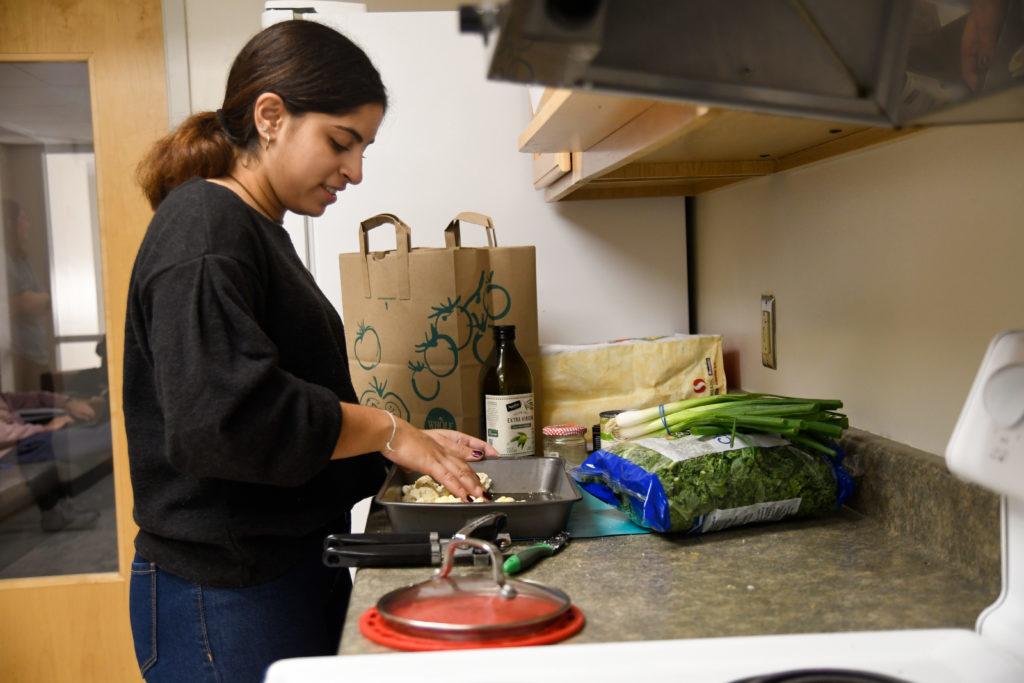Students can now attend monthly cooking classes in any freshman residence hall on the Foggy Bottom and Mount Vernon campuses.
After piloting a cooking class in Thurston Hall last academic year, the Residence Hall Association partnered with the Campus Living and Residential Education team and GW Dining to bring the program to all freshman residence halls. RHA President Trinity Diaz said the classes, which are open to all students, will encourage students to make healthy and sustainable meals during their transition to college dining.
“The whole goal is to just make cooking seem more accessible in residence halls because we find, for first-years, it’s intimidating to go to your community kitchen and cook,” Diaz said.
During each class, she said students watch and aid with food preparation while representatives from the RHA, campus living team and GW Dining prepare the meals. Diaz said she offers class participants a recipe card to take home with them so they can try cooking the dishes after the class.
Diaz said she talked with John Ralls, the director of communications and outreach for the Division of Operations, over the summer about expanding the program to all freshman residence halls because of the large turnout at last year’s classes.
She said each class will focus on different recipes, like mac and cheese, chili, sliders and a special Thanksgiving-themed class in Thurston.
“It’s not the same food,” Diaz said. “That’s something that’s very fun about it, that every time it’s different people showcasing recipes.”
Next week’s class will be held in Potomac House at 6:30 p.m., and the RHA will post updates to its Facebook page about upcoming classes, Diaz said. She said the RHA is brainstorming ways to hold a class in Fulbright Hall, where students have in-unit kitchens instead of a community kitchen.
“No matter what the size of the kitchen is, no matter where it is, we’re going to make sure we go to all the freshman buildings,” Diaz said.
Abigail Borin, an RHA hall council adviser, said the RHA scheduled this year’s classes on Sundays to coincide with Supermarket Sundays, a GW Dining program through which students receive a $10 discount when they spend $40 worth of groceries at Whole Foods and Safeway.
“Last year, we only had cooking classes in a few of the residence halls, and now we’ve expanded to every first-year residence hall because it saves them GWorld, it’s a more sustainable way to cook and eat food and it’s all around healthier,” Borin said.
She said each recipe takes less than 20 minutes to make, and students can either watch the cooking process or aid the representatives in the demonstration during the class.
“We’re going to try to make it as interactive as possible, but it really depends on who’s teaching and what their teaching style is, and also what everybody’s learning style is,” she said. “If they don’t want to get involved as heavily, they don’t have to, that’s totally up to them.”
She said the RHA strives to host at least 15 students each class, which was the average attendance at the classes the RHA held last year. She said the RHA will promote the classes by advertising with GW Dining.
“We’re hoping that it really does accelerate and that we get a higher turnout than last year,” she said.
Ana Little-Saña, a resident adviser in Thurston, said she planned to teach the first class of the semester in Thurston last week with recipes for mac and cheese and a harvest salad. But Little-Saña said she only reviewed the cooking steps for spaghetti squash and oatmeal that she had prepared in advance because the kitchen lacked clean supplies.
The RHA added pots and pans to each residence hall’s community kitchen last year to encourage students to use common spaces to prepare meals.
“Facility issues, kitchen not being cleaned regularly, residents leaving dirty dishes in the sink, odor issues, et cetera, are actually a bigger impediment to first years’ cooking than lack of knowledge,” Little-Saña said.
She said several of her residents said they are less likely to use the kitchen when other students have left dirty dishes and counters behind. Little-Saña added that she’d like to see additional resources directed to kitchen maintenance so that students feel more comfortable using the space to prepare meals.
“While there is some level of personal responsibility that residents need to take, one kitchen for 1,100-plus residents in a common space doesn’t set students up for success,” she said.
Clara Chahwan, a GW Dining ambassador who led West Hall’s class Sunday night, said that despite the small turnout, the two students who came were heavily engaged in the class.
“I’m looking forward to maybe seeing more people next time, because it’s always fun to learn how to cook,” she said. “But the people that were here were very interested, so it was great.”
Jake Messick, a freshman who attended the class at West Hall, said he came to the class because he wanted to learn to make homemade mac and cheese and improve his cooking skills.
“Cooking is something I know I need as a skill in the future, and it’s something that I’ve honestly not been the best at, but also I need to push myself out of my comfort zone,” he said.





